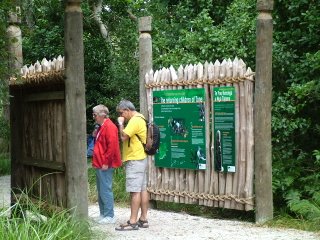Miscellany
On Saturday we looked at the weekend weather forecast and decided to put off "spring" house cleaning and go for a hike instead. Bethell’s Beach was glorious in the autumn sun, the hillside greenery flecked with tawny and mauve plumes of pampas grass. We got back home well before sunset but it was already pretty dark, and the sky was glowing an eerie greenish-black color. It was dead calm, with not so much as a breeze all evening.
I woke up at 6 am on Sunday and saw the first sign – trees wildly thrashing in the wind. By 8 am, it was raining a little. By noon, the remnants of Cyclone Larry had arrived in Parnell. During a mid-afternoon a lull, I went to the U to do some research, but wind gusts almost knocked me off my feet a couple times. The rain poured all day and all night, but then it was over and Monday was hot and sunny.
My research for Ocean Law is going well (knock wood), and my teaching job this term is great. As a Tuakana Mentor in Commercial Law, I’m an extra resource to help Maori and Pacific Island students. (“Tuakana” translates roughly as “big brother.”) I’m doing four hours of workshops and open office hours per week, so even with preparation time, email, phone calls and meetings, it shouldn’t be too time-consuming. The best part is that the students who show up are pretty motivated to learn, so it’s fun, too.
Speaking of fun, check out The World's Technology Podcast. This links to their blog (also on Blogger) and provides links to load up the 'cast. It's a weekly explanded version of tech stories from PRI's The World (public radio news show jointly produced by the BBC and Boston's WGBH).
I'm luddite enough to not have a cell phone, but I love this podcast. Their coverage of "regular" technology news is user-friendly for non-geeks, but they also have really off-beat tech stories. Check out #92, the piece titled "A Force More Powerful," about the International Center for Non-Violent Conflict's video game that trains potential revolutionaries in non-violent strategies for overcoming oppressive/repressive regimes. And #87, about Kiva, a group that raises microdevelopement funds on the internet. For as little as $25, you can lend to a brick maker in Honduras or small farmers in Kenya. They also have excellent music selections.
Cheers,
Sandie






